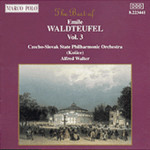
The Best of Vol 3 (Incls 'Invitation a la gavotte' & 'Pluie de diamants')
 $18.00
Out of Stock
$18.00
Out of Stock6+ weeks add to cart
WALDTEUFEL
The Best of Vol 3 (Incls 'Invitation a la gavotte' & 'Pluie de diamants')
Slovak State Philharmonic Orchestra, Kosice, Alfred Walter
[ Marco Polo / CD ]
Release Date: Wednesday 1 July 2009
This item is currently out of stock. It may take 6 or more weeks to obtain from when you place your order as this is a specialist product.
Emile Waldteufel was born in Strasbourg on 9 December 1837, just seven weeks after the elder Johann Strauss gave his first concert on French soil in that very city.
Like Johann Strauss, Emile Waldteufel came from a family of dance musicians, being preceded in the business by his father Louis (1801-84) and brother Léon (1832-84). Despite their Germanic surname, the family were French. This is explained by the fact that they hailed from Alsace, which despite strong German traditions had been fully integrated into France since 1793.
Emile Waldteufel was born in Strasbourg on 9 December 1837, just seven weeks after the elder Johann Strauss gave his first concert on French soil in that very city. When he was seven the family moved to Paris for Léon to take up a place as a violin student at the Paris Conservatoire. Emile Waldteufel was to live in Paris for the rest of his life, and he in turn studied piano at the Conservatoire from 1853 to 1857, his classmates there including Jules Massenet.
Meanwhile the family dance orchestra was becoming one of the best-known in Paris, increasingly in demand for Society balls during Napoleon III's Second Empire. In 1865 Emile was appointed court pianist to the Empress Eugénie in succession to Joseph Ascher (composer of 'Alice, where art thou?'), performing at Court functions not only in Paris but in Biarritz and Compiègne. From 1867 the Waldteufel orchestra played at Napoleon III's magnificent Court balls at the Tuileries.
After the Franco-Prussian War the orchestra again presided at the Presidential balls at the Élysée. Yet so far Emile Waldteufel's dances had been known only to a relatively limited Society audience. By the time international fame came he was almost forty. In 1874 he happened to be playing at a soirée attended by the Prince of Wales, the future Edward VII. The Prince complimented him on his waltz Manolo and agreed to help launch his music in London.
The result was a long-term publishing contract with the London firm of Hopwood & Crew. Since the firm was half-owned by Charles Coote, director of Coote & Tinney's Band, the premier London dance orchestra, this also gave access to the musical programmes of Queen Victoria's State Balls at Buckingham Palace. For several years Emile Waldteufel's music dominated the programmes there, generating him world-wide fame as he turned out a string of works that enjoyed huge popularity - including his best-known work Les Patineurs ('The Skaters') in 1882.
Tracks:
Soiree d'ete, Op. 188
Invitation a la gavotte, Op. 246
Les Sirenes, Op. 154
Ma Voisines, Op. 206
Les Sourires, Op. 187
Pluie de diamants, Op. 160
Tres jolie, Op. 159
Joyeux Paris, Op. 215
Tout en rose, Op. 200



![MARBECKS COLLECTABLE: Suppe: Overtures, Vol. 2 (Incls Boccacio & Die Schone Galatea [The Beautiful Galatea] ) cover](https://images.marbecks.co.nz/_thumbnails/10129/10129376.jpg)